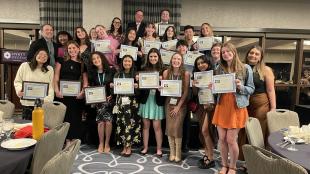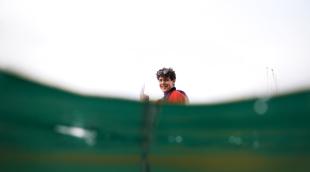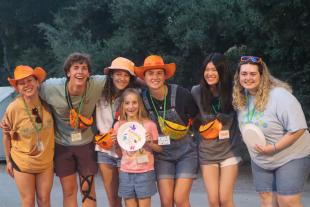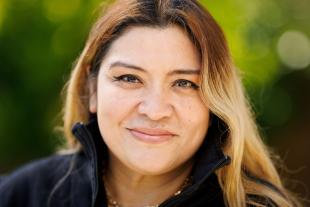Congrats, Grads! Meet Six Outstanding Students from the Class of 2023
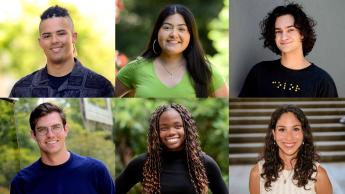
Education changed for Cal Poly’s Class of 2023 with the introduction of the virtual classroom (which has also spilled over to the working world).
It later fueled students’ hunger for Learn by Doing and pent-up interest in hands-on extracurricular activities as campus life slowly returned to normal.
While COVID-19 was part of the reality for the nearly 5,018 eligible taking part in six commencement ceremonies on June 17 and 18, these grads leave Cal Poly fortified by overcoming their challenges, ready to begin careers or move on to advanced studies.
Meet six outstanding members of the Class of 2023 — graduates tested by circumstances beyond their control whose drive, attitude and aptitude inspired their quest to become accountants, architects, biologists, engineers, future educators and medical professionals.
Jake Roth 
Philip and Christina Bailey College of Science and Mathematics
Jake Roth is ready to begin his career in marine sciences.
“I want to be a cetacean biologist, specifically to study large whales in the Eastern Pacific,” said the Bellevue, Washington, resident. “I will go back for more schooling eventually, but right now I am ready to experience the working world.”
He has made steady progress as a scholar and a leader since his arrival as a freshman on the Central Coast in the fall of 2019.
“I came to Cal Poly as a kid who was unsure of who he was, without the slightest sense of direction,” he said. “I will be leaving Cal Poly as a young man with a greater sense of who he is.”
Roth has been active in the Black Student Union and Black Academic Excellence Center “that made me feel uplifted and supported by a strong black community of like-minded individuals.”
And his introduction to his field exceeded his initial impressions.
“Being able to take marine science courses throughout my time at Cal Poly — even as a first-year — gave me an appreciation and understanding of the science I would not have otherwise held,” he added. “Through the many fantastic professors here, I have learned much about the field and what interests me and what doesn’t.”
Like many students, Roth said his biggest challenge was adjusting to the isolation and virtual instruction in the wake of the pandemic.
“Not only was it difficult to maintain the new friendships I made at school, I also felt cheated out of a Learn by Doing experience,” he said. “I overcame these difficulties by making the most with what I had during the time and preparing to jump headfirst into a Learn by Doing experience when I returned to San Luis Obispo.”
He became active in clubs and jobs related to his professional interests, including the Cal Poly SCUBA Club and the Marine Sciences Club, for ocean lovers of all academic disciplines; as well as working in a variety of science-related campus labs, including marine chemistry, fish behavior and drone operations. He served as a student facilitator in the marine sciences outreach program supported by Santa Rosa Creek Foundation for Central Valley teens who took part in field trips, Learn by Doing labs and summer camps.
He also worked with Cal Poly’s research lab that partners with the Friends of the Elephant Seal nonprofit organization, whose members serve as docents at the elephant seal viewing area and conduct community outreach at the Piedras Blancas Elephant Seal Rookery north of Hearst San Simeon State Historical Monument. Those efforts paid off.
Earlier this year, the 21-year-old was named to the 2023 cohort of a program that was launched in 2021 by Long Beach’s Aquarium of the Pacific — the largest aquarium in California, occupying more than 360,000-square-feet of space along Long Beach’s Rainbow Harbor.
Roth said his biggest accomplishment at Cal Poly was being selected for the aquarium’s African American Scholarship Program, which provides $10,000 to support his studies and exploration of fields related to the aquarium’s work.
“Marine science can be labor of love because of the expense and travel and often requiring years of volunteer work to get established in the field," Roth said. “As part of the fellowship, we’re in a network that can help grow representation of Black students in marine science, academia and industry.”
Roth is proud of his time in the Bailey College and the university.
“Cal Poly helped me meet my education goals by allowing me to obtain a degree in a field I love while also giving me hands-on, learning experience,” he said. “The experience I have has been an invaluable asset entering the working world.”
Daniela Ramos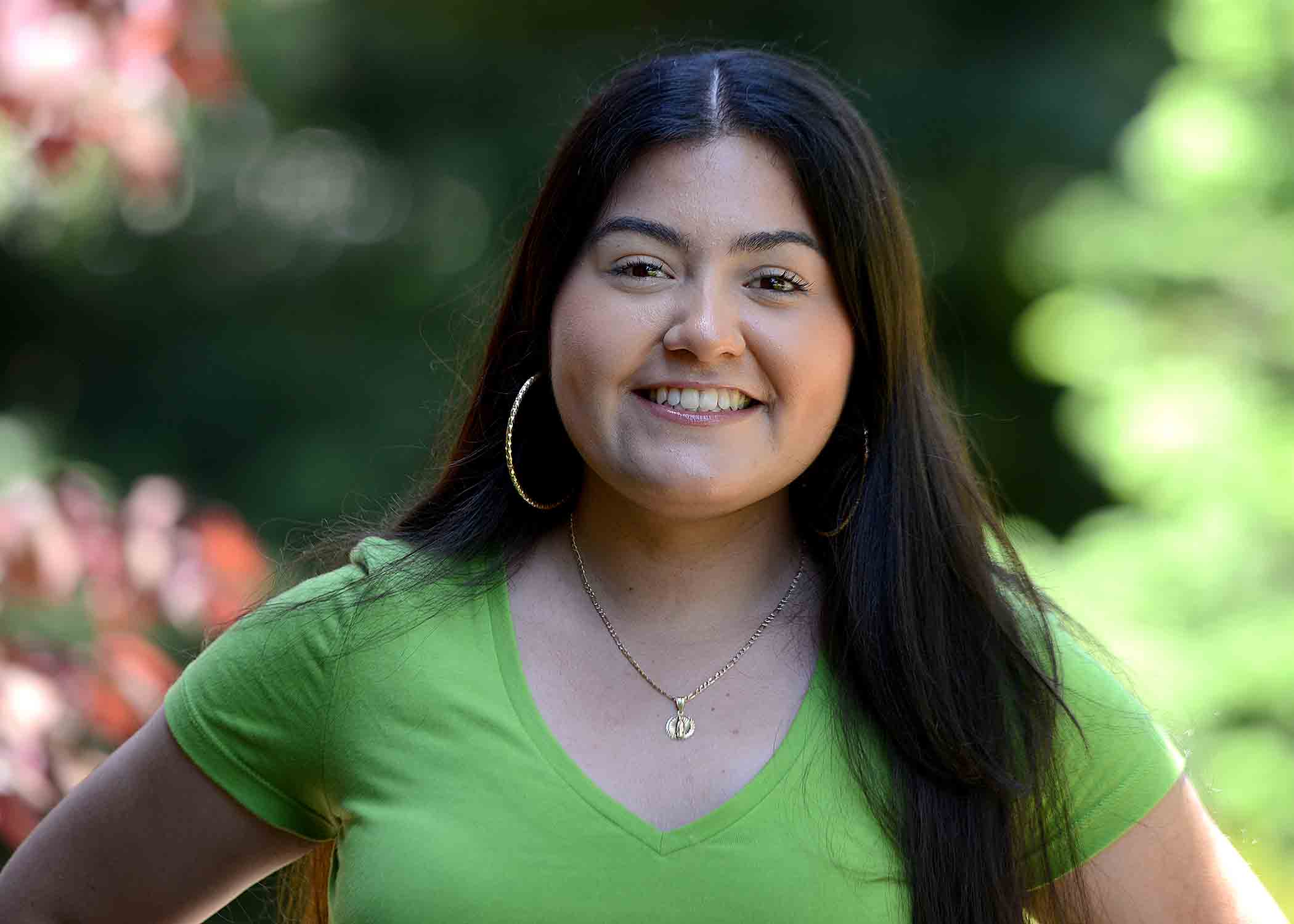
College of Agriculture, Food and Environmental Sciences
Daniela Ramos knew she would attend Cal Poly after a “heartfelt” campus visit with her mother in 2017.
“My parents have been farmworkers their whole lives, so I didn’t have the opportunity to go on field trips with them as chaperones,” said the Wasco, California, resident. “During my sophomore year, a day trip to Cal Poly was offered by a high school program I was a part of. I signed my mom up as a chaperone since her work season was coming to an end, and both of us had the opportunity to tour a college campus for the very first time — together.
“That’s a memory I will never forget. I decided to attend because of the experience my mom and I had when touring Cal Poly.”
The agricultural communications major jump-started her college education thanks to dual enrollment at Bakersfield College while a Wasco High School student.
“My situation was a lot different than other first-year students,” she said. “When I graduated high school, I had earned an associate arts degree in agricultural business as well. In my first year at Cal Poly, I was academically considered a junior-standing student.”
She struggled in her first quarters of upper-division coursework. But after finding her academic footing, she placed on the Dean’s List several times.
She also overcame hurdles that many first-generation students face.
“My biggest challenge was learning how to navigate the financial aid system and my higher education aspirations,” she said. “I learned how to deal with these by building relationships with my advisor and academic counselor at the Mustang Success Center and within my major’s department.”
Just as she was active in high school — serving as a student representative on her school board, followed by leadership in her school’s student government — she dove into extracurricular activities at Cal Poly. She served as an officer in Latinos In Agriculture. The club, through the national Minorities in Agriculture, Natural Resources and Related Science, or MANRRS organization, participates and interacts with other diversity and agriculturally focused clubs across the U.S.
“My biggest accomplishment was serving as one of the co-chairs for our annual conference,” Ramos said of the annual 26-Hours of Science and Technology in Agriculture program showcasing the club, college and campus.
With the help of college faculty, the two-day event is an opportunity for minority high school sophomore and juniors to visit Cal Poly and experience the opportunities that the agriculture industry has to offer through technical and hands-on experiences at Cal Poly.
The event attracted about 100 students from more than a dozen high schools to experience Learn by Doing — the key element that attracted Ramos to Cal Poly.
“I am a visual and hands-on learner,” she said, “so through Learn by Doing I was able to increase my academic retention skills and also discover new interests as a student throughout the lab curriculum I was a part of. My future goals are definitely shaped with Learn by Doing in terms of having an equal balance between technical work and hands-on work. This balance is essential in creating a successful future.”
After graduation, Ramos won’t be traveling far. In July, she’ll start a master’s program in agricultural education at Cal Poly in her quest to teach at the community college level.
“I want to inspire and offer a helping hand to students pursuing a higher education,” she said.
Maryam Abutabikh 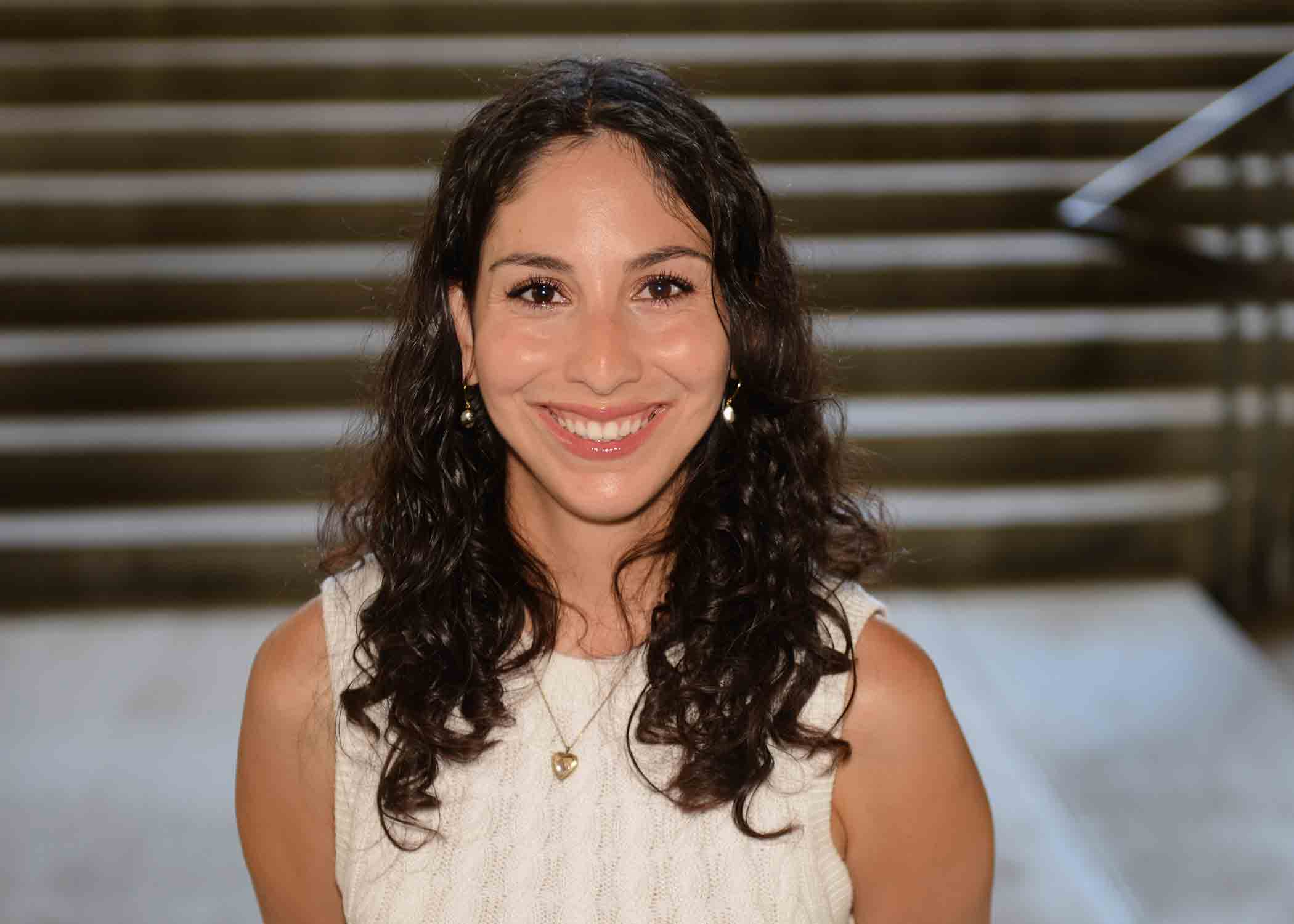
College of Architecture and Environmental Design
Fifth-year senior Maryam Abutabikh stood out among her landscape architecture peers. Department faculty witnessed it in class and through her multiple behind-the-scenes roles at the college and nominated the San Diego County resident for the Landscape Architecture Foundation’s prestigious Olmsted Scholars Program, which recognizes one outstanding student leader from each accredited landscape architecture program in the U.S. and Canada.
Abutabikh was selected the 2023 National Olmsted Scholar — the first Cal Poly undergraduate to receive the honor since the program began in 2008 — and will be honored in Minneapolis in October.
“Students were both honored for past achievements and recognized for their future potential to influence the landscape architecture discipline,” she said.
As the child of two Iraqi immigrants, Abutabikh understands the value of having a strong sense of community and a culturally relatable support network.
She plans to use the $15,000 award to advance aspects of her capstone project, which focuses on targeting community-led programs in El Cajon, California — a city of 105,000 located 40 miles east of her home in Carlsbad.
Her capstone, titled “Bridging Belonging,” will identify gaps in existing refugee services that can be addressed by public space interventions to increase interaction, inclusion and the well-being of refugees after their life-altering, often traumatic, experiences. Abutabikh also received an American Society of Landscape Architecture Honor Award for the project after presenting to a panel of six jurors. Cal Poly was Abutabikh's dream school.
“I knew I wanted to pursue a degree in some sort of design field related to the built environment, and the architecture and environmental design programs at Cal Poly were phenomenal,” the 23-year-old said. “It was an easy decision for me, and landscape architecture seemed to be the perfect fit for what I was looking for.”
Last summer she used that knowledge to work as an intern at the Kimley-Horn office in San Diego, one of the nation’s premier planning and design consulting firms. After graduation, she’ll begin her career there as a landscape designer.
Like her campus peers, Abutabikh’s Cal Poly education started normally for the first year and a half before the pandemic in spring of 2020 brought about virtual classes, online social activities, and other lifestyle changes.
The resulting isolation was her biggest challenge.
“It became a lot more difficult to feel connected to my professors and peers, so I had to learn to rely on myself and really hold myself accountable for advancing my education and career readiness in the direction I wanted to move towards,” she said.
As the campus edged toward normalcy, her focus returned with more hands-on work.
“I came into college really wanting to make the most out of my education and invest in my time here,” she said. “Learn by Doing really refined my critical thinking skills and empowered me to become a self-starter even if I didn’t quite know how to go about something quite yet.”
Her ambition extended beyond school. She branched out to make career connections with alumni, joined extracurricular activities such as the college ambassadors who gave college tours to prospective students, their families and student professional groups, and even nonprofit work. She also worked in the college dean’s office and as an officer who coordinated campus tours.
The past years have been life-altering thanks to professors who “really worked hard to create well-rounded students ready to enter the professional world, and who also made me feel so welcome and lucky to have been a part of the program.”
She’s also grateful for her classmates.
“I constantly felt amazed by my peers in the program,” she said. “The Landscape Architecture Department is smaller than many other majors, so we get to know each other very well. The connections I made with my classmates over the past years have taught me so much about how unique every designer’s approach to a problem can be. I was so inspired watching their work evolve throughout the years.”
Matthew Bornhorst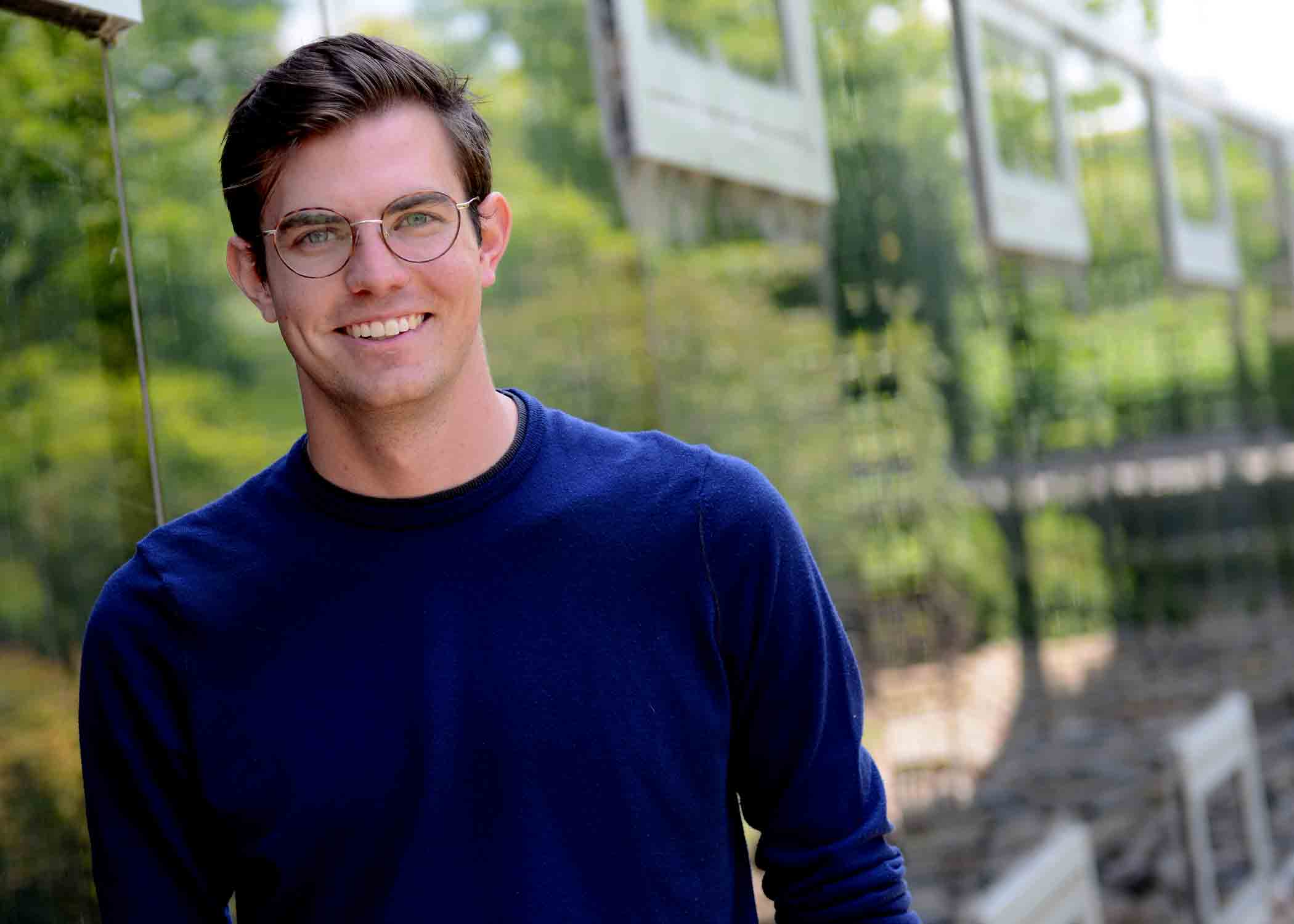
College of Engineering
The sky is not the limit for Matthew Bornhorst. The aerospace engineering major is aiming higher — space.
“The most impactful Learn by Doing moments for me didn’t happen in the classroom but in my extracurriculars,” he said. “I have been involved with Cal Poly Space Systems and Mustang News primarily in my time at Cal Poly, and they have been instrumental in shaping who I want to be. I wasn’t really a rocket guy before I came to Cal Poly, but I joined early on freshman year and found a passion for rocketry that’s stuck with me ever since.”
Bornhorst was active in the Cal Poly Space Systems club’s entry in the third Alka-Rocket Challenge, a national competition that asked university students to design and launch a rocket, propelled only by the effervescent Alka-Seltzer tablets and water, in pursuit of a new Guinness World Record altitude title and up to $30,000. A Cal Poly team was one of five finalists in 2018 and 2019.
“I helped with assembly and testing and flew down to Florida to represent Cal Poly Space Systems at the final competition,” Bornhorst said.
The Aurora, Colorado, resident faced the challenges of the pandemic that hit in spring of 2020.
“Of course, being in college for the last four years, COVID has dominated my experience,” he said. “It hit my extracurriculars especially hard because they were hard to do over Zoom. So that meant that I had to make the last two years in-person count. I came into those years with that attitude and was able to get a lot of stuff done and accomplish a lot in my time back on campus.”
That included his involvement in the space systems club’s effort to develop a rocket engine that burns a mixture of ethanol and nitrous oxide. The club spent nearly three months constructing the Dulcimer project’s much-needed rocket engine test stand, which became operational in late May.
“I was working on completing the hot-fire testing for Cal Poly Space System’s first liquid bi-propellant rocket engine,” Bornhorst said. “After sitting through countless meetings and fighting for this project to exist, seeing the physical manifestation of all of our hard work has been amazing.”
Outside of engineering, he was involved as a video producer for the student-run media group and focused on producing live events and sports recaps.
“Being in Mustang News has added a completely different side focusing of storytelling and understanding a side of Cal Poly most engineers never touched that has kept me grounded and shaped who I am today,” Bornhorst said. “Most engineers don’t get as much experience public speaking and speaking in front of a camera as I have gotten through Mustang News, and that has shaped how I look at my future career because of my experience in communication.”
He’ll begin his aerospace career just down the coast as a launch engineer at SpaceX facilities at Vandenberg Space Force Base.
“At SpaceX, I will be on the booster refurbishment team,” Bornhorst said. “I will be cleaning and inspecting all of the first-stage boosters that SpaceX lands, fixing them up, putting the rocket back together and rolling it out to the launch pad to get it ready to go back to space.”
He looks forward to the future but will remember the Learn by Doing way and his green-and-gold roots.
“As a Coloradan, I had never even heard of the Central Coast, but it quickly became a place I will always want to come back to,” the 22-year-old said. “Beyond that, it has introduced me to countless friends and connections that I know I will be bringing with me for the rest of my life. Cal Poly also gave me a great foundation to be a life-long learner.”
M.W. Kaplan 
College of Liberal Arts
M.W. Kaplan weathered a worldwide pandemic with a compromised immune system and will leave Cal Poly inspired by the potential the future holds.
“My time at Cal Poly was difficult, but it also gave me a lot of opportunities to grow and create change,” said Kaplan, who uses they/them/theirs pronouns. They graduated in 2019 from the Biomedical and Allied Health STEM program at Glen Burnie High School in a suburb of Baltimore.
BMAH allows highly motivated and academically eligible participants to study and explore career opportunities across the spectrum of healthcare professions. The Annapolis, Maryland, resident chose Cal Poly for its engineering and Learn by Doing path and proximity to family in California.
“Through Learn by Doing, I quickly found out mechanical engineering was not really what I wanted to spend my time doing,” Kaplan said. “In the Communications Department, applied projects and activities are what fostered my understanding of the theories I was learning and showed me how much I’ve learned. I’ve come out with the knowledge and confidence to apply what I learned and through Learn by Doing found that I have a passion for health communication that I plan to continue in my post-graduate life.”
Change was Kaplan’s mantra while at Cal Poly, but it wasn’t limited to just the field of study.
“The vast network of changemakers at Cal Poly, particularly the QTBIPOC (Queer and Trans/ Black/Indigenous/People of Color) and disability communities really inspired me to keep pushing boundaries while honoring my own limits,” the 21-year-old said. “Members of the Communications Department and Health Center — who saw a lot of me — were very vocal in their support, and my friends and family never failed to let me know how proud they were of everything I accomplished.”
Kaplan relied on Cal Poly’s Disability Resource Center for assistive technology devices that helped them to become a more successful student. Accessibility on such a hilly and spread-out campus, built over the past 100 years, and health difficulties “were my biggest challenges,” they said.
Kaplan carries a cane and is immunocompromised, which led to uncertainty and frustration in 2022 as Cal Poly and the world began to move past pandemic restrictions. They also suffer headaches, sore throats, nausea and fatigue almost daily due to a musculoskeletal pain disorder. A steroid that helps with the symptoms also lowers immunity, making the communication studies major more susceptible to other diseases — including COVID.
As head of the Disability Alliance club, Kaplan raised concerns of immunocompromised students to campus administrators and faculty — and in the process found a calling as an advocate.
“I think my biggest accomplishment was creating the Disability Alliance and getting to make a lot of change with an incredible community,” Kaplan said. “Representing at the club showcase — a dream since my first year — and Culture Fest, creating the ASI Secretary of Accessibility position, meeting internationally recognized disability rights activist Judy Huemann, and getting to lead the first-ever disability-inclusive WOW group are among the most rewarding experiences of my life.”
Kaplan plans to work as a clinical medical assistant while preparing for a graduate nursing program.
“Ultimately, I want to help people, especially those who don’t normally get help,” they said. “I want to become a nurse practitioner to help fill massive healthcare gaps in rural areas and in patients with highly stigmatized mental health conditions.”
The university opened a lot of doors for the graduate-to-be.
“When I first started at Cal Poly, I was still new to understanding and living with my disabilities,” Kaplan said. “I was really worried about being able to manage them while I was a student and didn’t really have support or anyone who understood. Now, I’m very confident. I know how to manage my conditions. I’ve found a direction based around my passions and have built relationships with so many incredible people, it’s hard to believe sometimes!”
Kimberley Bhunu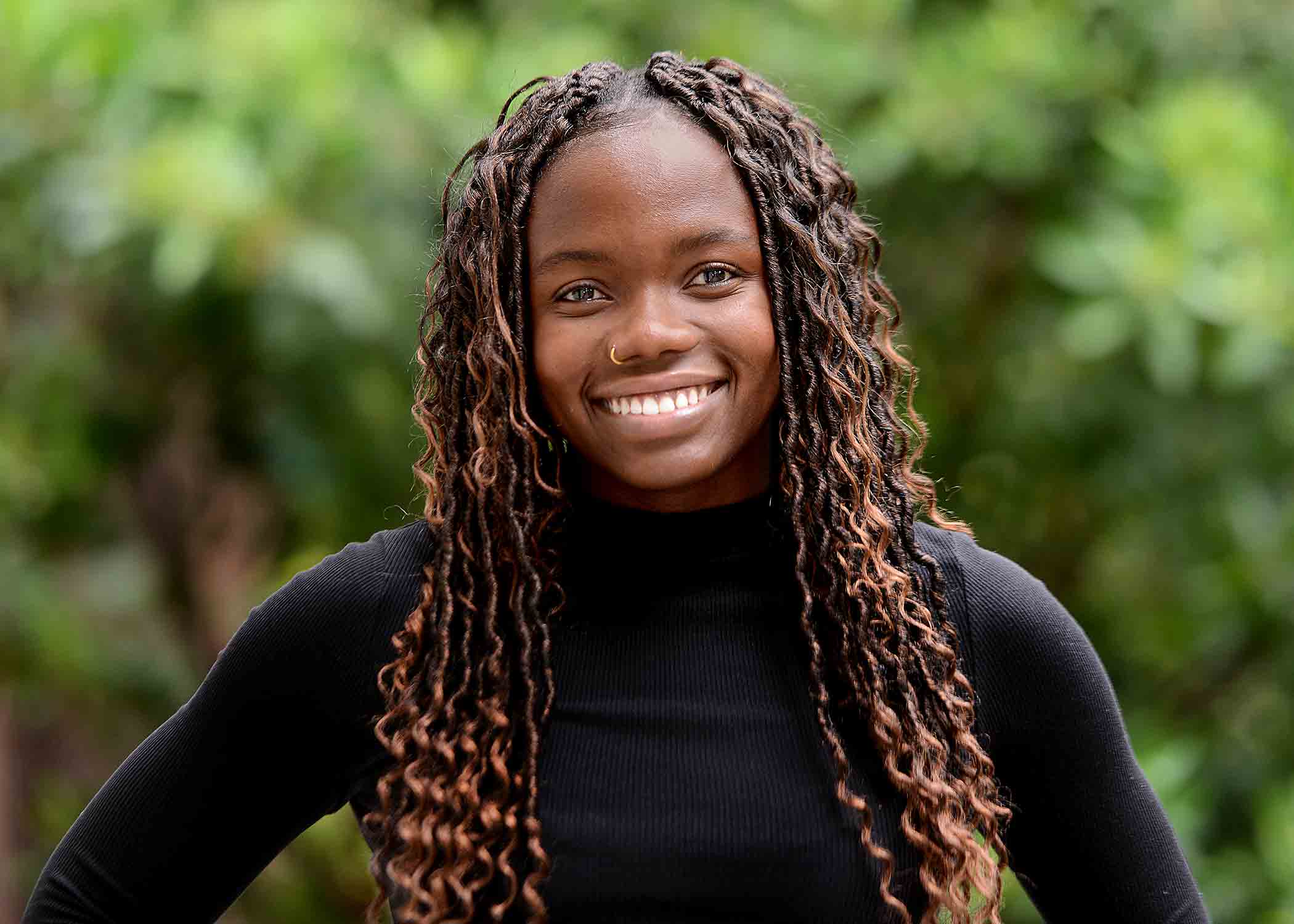
Orfalea College of Business
Kimberley Bhunu took a giant leap coming to Cal Poly. The Harare, Zimbabwe, resident — who attended high school 7,000 miles from home in France — traveled halfway across the world to attend the Learn by Doing campus in 2018, sight-unseen, and play tennis for the NCAA team.
She leaves Cal Poly with two degrees — bachelor’s in business administration with an accounting concentration (2022) and a master’s in business analytics — and as a co-founder of a nonprofit that seeks to bridge the opportunity gap for underprivileged people while helping end trends of generational poverty. She also inked her name in the Mustangs record books for a history-making stint as a scholar-athlete.
“Coming to the U.S. was a lot to take in,” she said. “I thought I would be completely overwhelmed. Now, I am a more confident and accomplished individual. Because of some of my experiences at Cal Poly, I have a greater appreciation of myself and what I have to offer.”
Bhunu came to Cal Poly via a French tennis academy run by former Serena Williams coach Patrick Mouratoglou — where she saw legends like Novak Djokovic and Williams, who Bhunu portrayed as a younger player in a 2017 video promoting a video app/game.
“Serena’s someone I’ve always idolized,” said Bhunu who, like Williams, plays aggressively on the court. “Getting to meet her in person felt surreal — just an incredible experience.”
Because of visa issues, Bhunu committed to becoming a Mustang without ever getting a real look at her future home.
“Two things made me decide to attend,” she said. “I saw that it had good academics and many of its business students were set up with job opportunities before they graduated. Secondly, I liked the tennis team at Cal Poly. I had talked to the coach and a couple of the girls and really liked the values of the program.”
Cal Poly's relative lack of diversity was “really hard to adjust to,” she said — but she found a community for herself through the Black Student Union, and the tennis team became her family.
On the court, she found success in her first few matches. Then, just weeks into the 2019 season, she suffered a torn ACL against the University of San Francisco that required a nine-month rehab.
She returned the next spring just as COVID-19 curtailed the season. The pandemic also prevented her from seeing her family for over two years, but she persevered. She’s a two-time All-Big West First Team selection in doubles and twice earned All-Conference honors as a singles player.
Just last month, she picked up the Mustangs’ first postseason singles victory in Division I program history in the quarterfinals of the inaugural Universal Tennis NIT Championship in Atlanta.
Off the court she shined as a scholar, making the Dean’s List eight times, and as an entrepreneur. In 2022, Bhunu and some fellow students created Craft by Jáde — a nonprofit focused on bridging the opportunity gap for underprivileged people in Zimbabwe and Nigeria and ending the cycle of generational poverty in both countries through the sale of Afrocentric apparel, such as dresses and sandals. Bhunu handles business operations and finances.
“We use the proceeds from the sales, as well as donations, towards developmental programs in Nigeria and Zimbabwe,” said Bhunu, who considers the venture her biggest accomplishment as a student. “In Zimbabwe, we’re doing tennis development because tennis has given me so many opportunities. Who would’ve guessed I would have gone to Cal Poly on a full scholarship? We want to be able to provide similar opportunities to students.”
The 22-year-old will begin her career as an external auditor for Ernst & Young in San Francisco.
“I will always cherish the memories and friendships I made here at Cal Poly,” she said. “I couldn't have made it through this journey alone, so I want to express my heartfelt gratitude to everyone who walked beside me. I truly hope that I’ve had a positive impact on them, just as they’ve had on me.”
Want more Learn by Doing stories in your life? Sign up for our monthly newsletter, the Cal Poly News Recap!

